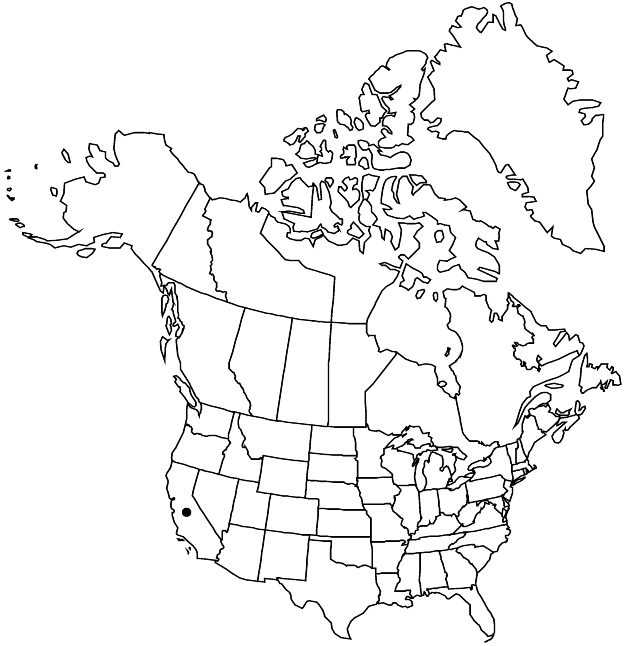Difference between revisions of "Chorizanthe wheeleri"
Proc. Amer. Acad. Arts 12: 272. 1877.
FNA>Volume Importer |
imported>Volume Importer |
||
| (2 intermediate revisions by one other user not shown) | |||
| Line 8: | Line 8: | ||
}} | }} | ||
|common_names=Wheeler’s spineflower | |common_names=Wheeler’s spineflower | ||
| + | |special_status={{Treatment/ID/Special_status | ||
| + | |code=E | ||
| + | |label=Endemic | ||
| + | }} | ||
|basionyms= | |basionyms= | ||
|synonyms={{Treatment/ID/Synonym | |synonyms={{Treatment/ID/Synonym | ||
|name=Chorizanthe insularis | |name=Chorizanthe insularis | ||
|authority=R. Hoffmann | |authority=R. Hoffmann | ||
| + | |rank=species | ||
}} | }} | ||
|hierarchy=Polygonaceae;Polygonaceae subfam. Eriogonoideae;Chorizanthe;Chorizanthe subg. Amphietes;Chorizanthe sect. Ptelosepala;Chorizanthe wheeleri | |hierarchy=Polygonaceae;Polygonaceae subfam. Eriogonoideae;Chorizanthe;Chorizanthe subg. Amphietes;Chorizanthe sect. Ptelosepala;Chorizanthe wheeleri | ||
| Line 36: | Line 41: | ||
-->{{#Taxon: | -->{{#Taxon: | ||
name=Chorizanthe wheeleri | name=Chorizanthe wheeleri | ||
| − | |||
|authority=S. Watson | |authority=S. Watson | ||
|rank=species | |rank=species | ||
| Line 50: | Line 54: | ||
|publication title=Proc. Amer. Acad. Arts | |publication title=Proc. Amer. Acad. Arts | ||
|publication year=1877 | |publication year=1877 | ||
| − | |special status= | + | |special status=Endemic |
| − | |source xml=https:// | + | |source xml=https://bitbucket.org/aafc-mbb/fna-data-curation/src/2e0870ddd59836b60bcf96646a41e87ea5a5943a/coarse_grained_fna_xml/V5/V5_972.xml |
|subfamily=Polygonaceae subfam. Eriogonoideae | |subfamily=Polygonaceae subfam. Eriogonoideae | ||
|genus=Chorizanthe | |genus=Chorizanthe | ||
Latest revision as of 22:15, 5 November 2020
Plants erect to spreading, 0.5–2(–2.5) × 1–2 dm, thinly pubescent. Leaves basal; petiole 0.5–3 cm; blade elliptic to oblong, 0.5–2 × 0.2–0.6 cm, thinly pubescent adaxially, tomentose abaxially. Inflorescences mostly flat-topped, openly branched, greenish to reddish; bracts persistent, 2, usually leaflike at proximal nodes and similar to leaf blades, short-petiolate, oblong, 0.5–1.2 cm × 2–4 mm, sessile, reduced and scalelike at distal nodes, linear, acicular, often acerose, 0.1–0.5 cm × 0.5–1 mm, awns straight, 0.5–1 mm. Involucres in dense terminal clusters with 1 at node of dichotomies, reddish, cylindric, not ventricose, 2–2.5 mm, corrugate, without scarious or membranous margins, thinly pubescent with stoutish, recurved hairs; teeth spreading, unequal, 0.3–0.8(–1) mm, with 3 longer ones more erect than 3 shorter and less-prominent ones; awns uncinate, 0.3–0.5 mm. Flowers exserted; perianth white or rose or red with white lobes, cylindric, 2.5–3 mm, glabrous except for few scattered hairs ca. midlength along midrib abaxially; tepals connate 1/2 their length, monomorphic to slightly dimorphic, oblong, rounded apically, those of outer whorl usually slightly broader and longer than those of inner whorl; stamens 6, included; filaments distinct, 1.5–2 mm, glabrous; anthers pink to red, oblong, 0.3–0.4 mm. Achenes brown, lenticular, 2.5–3 mm.
Phenology: Flowering Apr–Jun.
Habitat: Gravelly to rocky slopes, coastal scrub communities
Elevation: 0-400(-600) m
Discussion
Chorizanthe wheeleri is a rare insular endemic known only from Santa Cruz and Santa Rosa islands.
Selected References
None.
